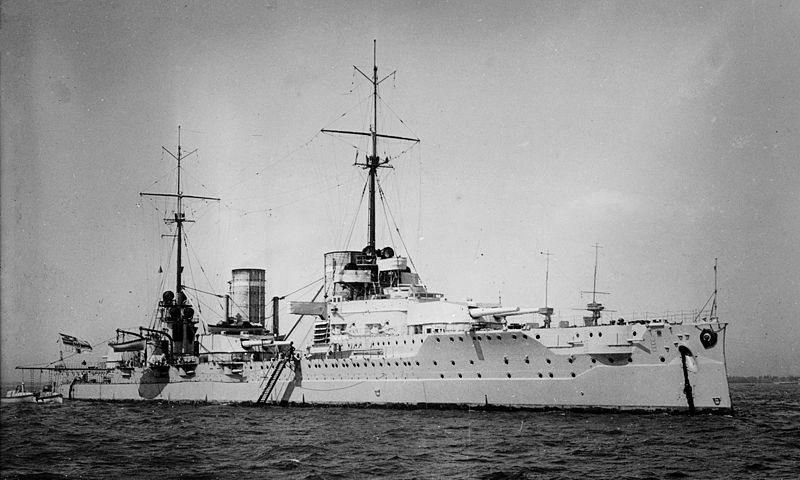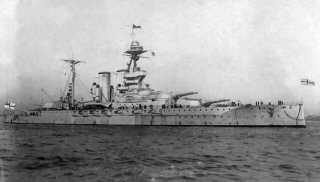|
|
|
|
|
|
|
BATTAGLIA NAVALE DELLO JUTLAND
NAVAL BATTLE OF JUTLAND
|
|
|
|
|
|
|
31 MAGGIO 1916 - 1° GIUGNO 1916


STORIA / HISTORY
L'ATTACCO DELLE SILURANTI TEDESCHE /
THE ATTACK OF THE GERMANS TORPEDOES
L'ammiraglio Jellicoe, anche questa volta non accettò la sfida tedesca, limitandosi dapprima a mantenere sotto il fuoco delle sue corazzate le unità tedesche, ma allontanandosi di fronte alla minaccia delle siluranti e degli incrociatori. Questa sua tattica gli valse in patria numerose critiche.
Fu detto che alla seconda accostata di von Scheer il comandante della Grand Fleet avrebbe potuto dividere la sua formazione, prendendo così la flotta tedesca fra due fuochi.
Egli, invece, dimostrando di temere non tanto i cannoni quanto i siluri tedeschi, preferì rompere il contatto per poi riprendere la rotta verso sud. Alle 21 le due formazioni navigavano su rotte parallele, distanti poche miglia l'una dall'altra, in direzione dei banchi di mine di Heligoland, la flotta tedesca a ovest e quella britannica a est. Per l'ammiraglio von Scheer la situazione si faceva sempre più pericolosa.
Verso le 3 del mattino il chiarore sarebbe stato sufficiente per aprire il fuoco ed egli non voleva trovarsi a tu per tu con una flotta tanto più potente per 18 ore consecutive.
Doveva perciò passare ad est della flotta britannica per riguadagnare le proprie basi.Così, l'ammiraglio Scheersi convinse che l'unico modo di sfuggire ai britannici fosse attraversare lo stretto passaggio a ovest di Horns Riff; quindi mentre stava calando l'oscurità, Scheer ordinò alla flotta di dirigere risolutamente, seguendo la rotta più diretta, verso le coste occidentali dello Jutland. Poiché nel fare questo c'era il pericolo, come in effetti avvenne, che la flotta tedesca passasse attraverso la linea della flotta inglese in pattugliamento notturno, le torpediniere avrebbero in tal caso dovuto attaccare la flotta inglese per permettere di rompere il blocco.
In effetti le torpediniere tedesche sferrarono valorosi attacchi contro il centro della Grand Fleet, cogliendo completamente spiazzato Jellicoe, il quale, avendo intercettato un messaggio ingannevole in cui si faceva riferimento a sottomarini tedeschi diretti verso di lui, e ritenendo sconveniente una battaglia notturna, ordinò un cambio di rotta e puntò verso sud nell'intenzione di riprendere la battaglia il giorno seguente.In effetti, verso la mezzanotte, le navi britanniche incrociarono la rotta tedesca e la loro retroguardia aprì il fuoco sulle unità avversarie: incrociatori e cacciatorpediniere si diedero battaglia nell'oscurità, illuminata soltanto dai fari delle navi e dal folgorio delle bordate.
Poco prima dell'alba l'incrociatore corazzato britannico Black Prince venne affondato insieme a 5 cacciatorpediniere, mentre i tedeschi persero la vecchia nave di linea Pommern con 884 uomini a bordo e tre piccole cacciatorpediniere. I bagliori della battaglia notturna erano visibili a grande distanza, ma Jellicoe, credendo si trattasse di irrilevanti cannoneggiamenti tra singole unità di coda, non invertì la rotta.
THE ATTACK OF THE GERMANS TORPEDOES
The admiral Jellicoe, also this time didn't accept the German challenge, limiting at first himself to maintain under the fire of its battleships the German unities, but getting further himself in front of the threat of the torpedo ones and the cruisers.
This tactic of his was worth him in country numerous criticisms. It was said that to the second approached of von Scheer the commander of the Grand Fleet it would have been able to divide his formation, taking so the German fleet among two fires. Him, instead, showing to fear not so much the guns how much the German torpedos, preferred to break the contact for then to take back the rout toward south. To the 21 two formations sailed on parallel routs, distant few miles the one from the other, in direction of the benches of mines of Heligoland, the German fleet to west and that British to east. For the admiral von Scheer the situation did more and more him dangerous.
Toward the 3 of the morning the light would have been enough to open the fire and him he didn't want to be himself to you for you with a fleet so more powerful person for 18 consecutive hours. It owed therefore to pass to east of the British fleet to regain his/her own bases.
LE PIU' GRANDI BATTAGLIE NAVALI (NAVAL BATTLES)
BATTAGLIA NAVALE DELLO JUTLAND / JUTLAND NAVAL BATTLE
PORTAEREI NELLA STORIA (AIRCRAFT CARRIERS)
NAVI DA GUERRA (WARSHIPS AND BATTLESHIPS)